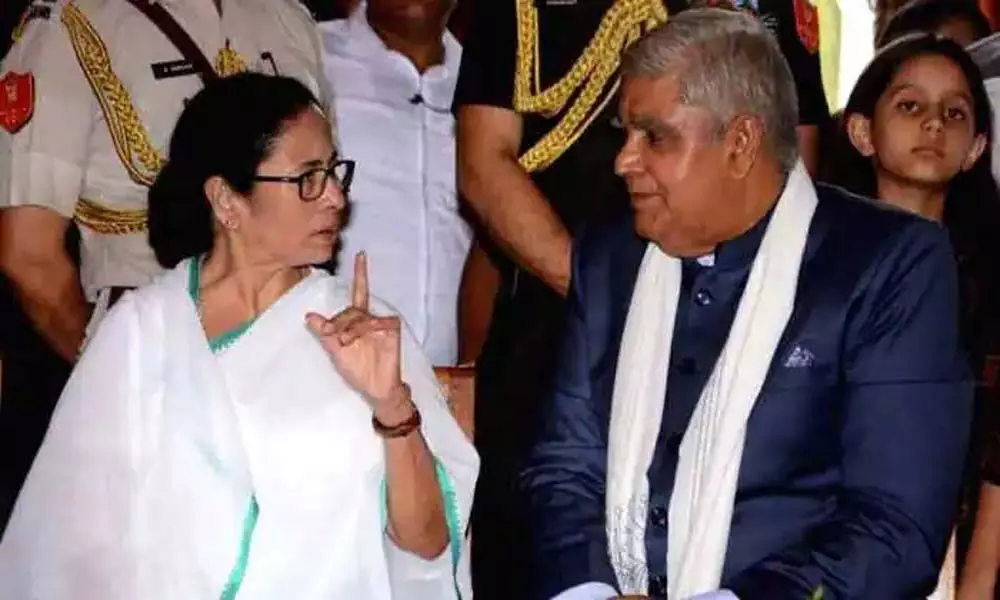Bengal Governor, CM at loggerheads; Public on the losing end
The relationship between an elected state government and a state Governor has never stooped down to such lows in the chronicles of Independent India, the way it's happening in Bengal today.
image for illustrative purpose

The relationship between an elected state government and a state Governor has never stooped down to such lows in the chronicles of Independent India, the way it's happening in Bengal today. For all practical purposes, these are two warring camps now, not just launching verbal tirades, but washing dirty linens in public, almost on a daily basis, hinting thereby at possible disruptions in the smooth functioning of the constitutional machinery and administrative mechanisms. And mind you that the primary function of the Governor is to preserve, protect and defend the constitution and the law as incorporated in their oath of office under the Article 159 of the Indian constitution in the administration of the State affairs.
All the governor's actions, recommendations and supervisory powers (Article 167c, Article 200, Article 213, Article 355, etc.) over the executive and legislative entities of a State shall be used to implement the provisions of the Constitution. In this respect, the governor has many different types of powers:
Executive powers related to administration, appointments and removals, Legislative powers related to lawmaking and the state legislature, that is State Legislative Assembly (Vidhan Sabha) or State Legislative Council (Vidhan Parishad),
Discretionary powers to be carried out according to the discretion of the governor. However, the Constitution makes it amply clear that the Governor has no role or powers in a contingency situation such as President's rule unless specifically permitted by the President under articles 160, 356 and 357. And possibly most significantly in the current context, the Governor is not permitted to take any decision on his own without state cabinet advise when an elected government is in charge under the provisions of Part VI of the Constitution.
Forget about these technical and legal arguments and counter arguments. What's actually happening on ground zero is that the current tweeter-happy West Bengal Governor Jagdeep Dhankar is either twitting or issuing press communique on virtually every little thing happening here and blaming it on the Mamata Banerjee, travelling to places that suits political agenda and scores political brownie points than anything else. People also wonder how can a Governor, the constitutional head of the State divulge publicly a telephonic conversation between him and the functional head that is the Chief Minister. The whole purpose of having or taking an oath of office and an oath of secrecy gets defeated at one go, instantaneously. Before the polls, he even went to the extent of asking for 'votes for a change'.
In the game of one-upmanship, the other camp is not to be left far behind either. The warriors in the TMC camp are coming out with facts (or misrepresented facts, as claimed by the Governor's camp appointments and the BJP camp), questioning of some of the Governor's relatives at Kolkata's historic Raj Bhawan, and now questioning the mention of Mr Dhankar in the Diary of the Jains of the Hawala scam ill fame. No camp looks ready to give in even an inch without a fight. In an unprecedented and rarest of the rare gesture the Governor even held a meeting of the BJP leaders on the corridors (veranda) of the Raj Bhawan.
The rift between the Governor and the state government is nothing new in India, especially whenever there were two different governments at the Centre and the state, but those were not in the same nature and proportion.
It does not require any rocket science to understand that in a parliamentary democracy like ours, a Governor must move and function realizing the constitutional limitations of the post and an elected government must show dignity and respect to the ornamental head of the state. Conflict happens when Governor fails (or takes time) to realize this simple truth. Such street fighting and maddening strife are neither good for our democratic principles and nor are they good for our social firmament. Constitutional goals should not get driven by political agenda. Discretionary powers are to be meant to be used discretely.The relationship between an elected state government and a state Governor has never stooped down to such lows in the chronicles of Independent India, the way it's happening in Bengal today.

